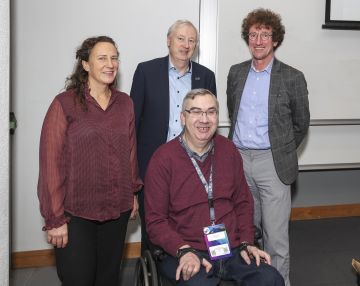SETU recently hosted the second Digital Education Conference (DEC24) with over 160 participants, marking a significant increase on last year’s conference.
This event held from Tuesday, 10 December to Wednesday, 11 December at SETU’s Cork Road Campus highlighted the significance of digital education excellent practice to the higher education community.
Co-chaired by Dr Zeta Dooly, Dr Gina Noonan and Dr Paul O’Leary, DEC24 welcomed delegates from ATU, MTU, SETU, Foroige, Maynooth University, GRETB, WWETB, LWETB, Trinity College Dublin, Walton Institute, RCSI, NLN, Skillnet, DCU, UL, UCC, TUD and TUS.
Dr Dooly, lecturer and researcher in Education and Technology remarked on the success of this conference, which she says “was in large part thanks to the many people who contributed as keynote speakers, in workshops and in paper presentations”.
Keynote speakers included Professor Martin Curley, Dr Aidan Walsh, Dr Leigh Graves Wolf and Dr James Diamond, who delivered fascinating seminars on the dramatic digitisation changes that could improve public health, wayfinding through the crossroads of technology, education and research and introducing generative Artificial Intelligence into teaching, learning and assessment beyond basic AI literacy.
In total 43 presenters delivered papers representing 122 paper authors, on data literacy, immersive technologies, sustainability, digital wellbeing, podcasting and entrepreneurship.

Choice of workshops
DEC24 offered a choice of 12 workshops for participants to try out new digital technologies, sustainability applications and virtual reality worlds for education.
“The talks were informative and engaging starting with Professor Marie-Claire Van Hout, Vice President of Research, Innovation and Impact, sponsors telling us all about their products, services, research and practice to Professor Martin Curley and Dr Aidan Walsh providing evidence and justification for Lean Education, personalised learning and taking innovative ideas and projects to implementation for impact within Digital Health landscape,” Dr Dooley said.
Dr Leigh Wolf delivered “Rí-Rá: Wayfinding Through the Crossroads of Technology, Education, and Research”, while Dr Jim Diamond, a US guest from John Hopkins University gave impetus for embracing AI (Beyond basic AI literacy) in an ethical fashion on the global charts, guiding everyone to use rhetoric and dialectic in prompt construction to deepen thinking.
Making music in a virtual world
“Making Music in a Virtual World” was led by Eoin Dolan and the Foroige team. Of interest to the audience was Marc Mbanda’s research on ‘The Effective Integration of Asylum Seekers and Refugees in the Irish Tertiary Education System’. Marc highlighted the dual challenges faced by these students: navigating typical student barriers (cost of living, accommodation, etc.) alongside additional legal and systemic hurdles, and so on,” Dr Dooley explained.
Another standout was the AFUN platform project by Mark Power and colleagues, designed to support motor skill development in autistic children.
Martin Curley's keynote on digitising healthcare was a highlight, showing how education can be the backdoor to breaking through the institutional inertia that hampers progress in the healthcare sector.
Dr Dooley gave special mention to Bernard Goldbach and Frances ODonnell for an excellent workshop on developing a personal knowledge management system using Obsidian in combination with other AI enabled tools.
Details of the DEC24 Digital Education Awards (link) will be announced in January, along with information on next year’s conference.


